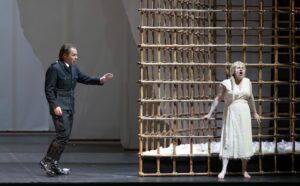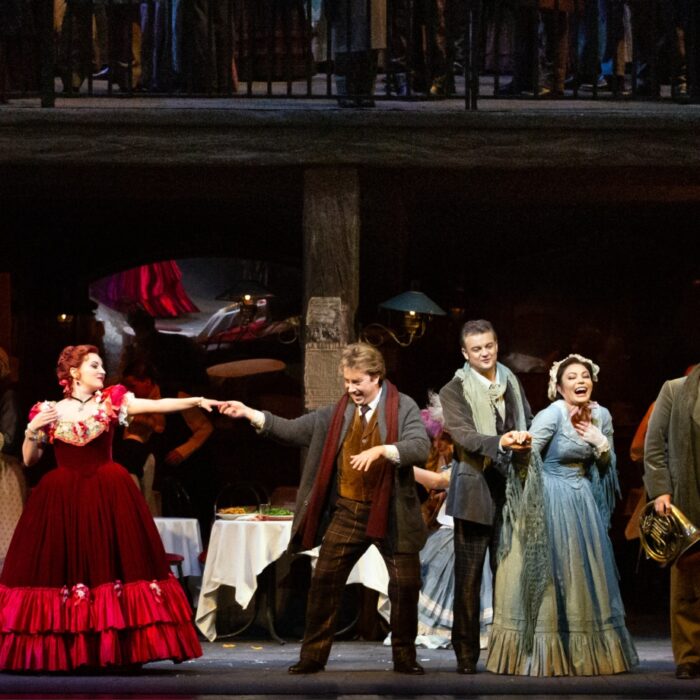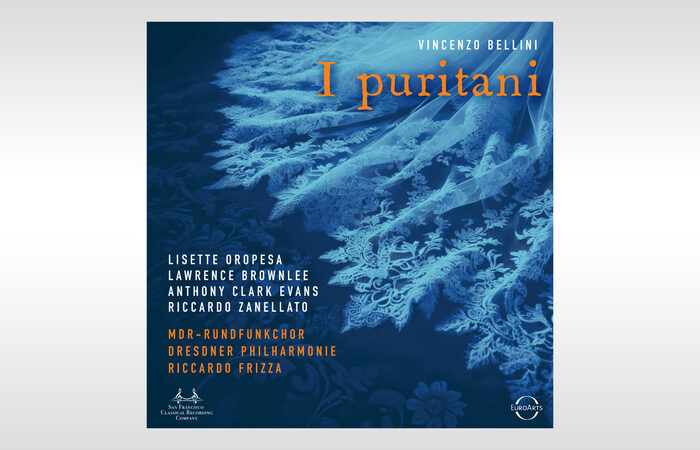
Opéra de Nice Côte d’Azur 2023-24 Review: Lakmé
By Robert Adelson & Jacqueline LetzterPhoto credit: © Dominique Jaussein
The Opéra de Nice Côte d’Azur inaugurated their 2023-2024 season with a new staging of Léo Delibe’s “Lakmé” coproduced with the Opéra-Comique in Paris, which premiered the production in September-October 2022, and the Opéra national du Rhin which will present performances in Mulhouse and Strasbourg in November 2023.
Pelly’s Anti-Kitsch ‘Lakmé’
This coproduction marks the first interpretation of “Lakmé” by French director Laurent Pelly, assisted in the Nice performances by Luc Birraux, with sets by Camille Dugas and lighting by Joël Adam. Pelly’s avowed goal was to avoid the kitsch of traditional settings in “exotic” nineteenth-century India. He achieved this by using minimalist sets, mostly uniformly white costumes, and theatrical concepts borrowed from Japanese kabuki and noh traditions. This created an abstract “other” with no explicit references to a particular country. The result, intended or not, was that it was rather the British characters who appeared kitsch, with their traditional city dress and caricatured military music.
Delibes composed “Lakmé” for the Théâtre de l’Opéra-Comique in Paris, where works had spoken dialogue in between the musical numbers. He later composed a version with recitatives replacing the dialogue, and it is this second version that is usually performed. The new Pelly production uses the original version with spoken dialogue, which clearly had a more immediate and direct effect on a French-speaking audience. More importantly, it transformed “Lakmé” into a number opera, with its advantages and disadvantages. The periodic return to dialogue provides greater contrast for the sung numbers, which thereby gain in intensity. However, it presents a greater challenge for the conductor, who must maintain musical and dramatic momentum amidst the starts and stops.
An Impressive Role Debut for Kathryn Lewek
The Paris and Mulhouse/Strasbourg performances feature French soprano Sabine Devieilhe as the Hindu princess. For the Nice performances, however, Lakmé is sung by the American Kathryn Lewek, for whom this is a role debut. This is also the first time Lewek returned to the Opéra de Nice since last year’s production of “Lucia di Lammermoor,” where her husband, the tenor Zach Borichevsky, jumped in at the very last minute to sing the role of Edgardo.
Lewek’s performance on October 1st was extraordinary and augurs for her setting a new standard for this iconic role. This is not to say that her singing was flawless; in her opening aria, for example, her trills on a high B-flat were somewhat tentative. Moreover, her interpretation of the famous “Air des clochettes” (“Où va la jeune Hindoue”) was characterized by such unusually fast tempi for both the introduction and main section that some of the rhythms were glossed over. The overall dramatic and music effect, however, was so brilliant that these details became inconsequential.
Her range of vocal colors was remarkable; there were moments when she blended so well with the woodwinds that one had difficulty discerning where her voice ended and the solo flute began. Likewise, her Act one aria “Pourquoi dans les grands bois” was touching because of the seemingly infinite variety of nuances she used to sing the single word “pourquoi.”
Any soprano singing the role of Lakmé must have absolute control over the extremities of her tessitura in a pianissimo dynamic. Lewek’s performance of the Act two berceuse “Sous le ciel tout étoilé” was marked by a superb legato, a darkly hued low register and a fantastic final high C. Similarly, her final declaration of love to Gérald, “tu m’as donné le plus doux rêve/Qu’on puisse avoir sous notre ciel,/Reste encore, pour qu’il s’achève,” culminates on a pianissimo high A that was nothing short of breathtaking.
Lewek is also a persuasive actress. In the Act two duo, “D’où viens-tu? Que veux-tu?,” when she first meets Gérald, she becomes like a wild animal both in her acting and her singing. She dramatically returned to this feral register in the Act two duo, “Ils allaient deux à deux,” when she realizes that Gérald is to abandon her.
A Special Casting Philosophy
The casting philosophy of Bertrand Rossi, Director of the Opéra de Nice Côte d’Azur, is to juxtapose in each production one internationally acclaimed artist with other less well-known and usually younger French singers. This approach can sometimes create pleasant surprises, as was the case in last season’s “Fidelio,” which paired the Florestan of Gregory Kunde with the Leonora of Angélique Boudeville. But sometimes this method results in an all-too apparent mismatch, as was the case with Lewek’s Lakmé and Thomas Bettinger’s Gérald. Bettinger’s opening aria “Prendre le dessin d’un bijou” was lovely, but as the performance progressed one noticed a habit of squeezing the last notes of phrases with a short accent. This was particularly apparent in the duo “C’est le Dieu de la jeunesse, C’est le Dieu du printemps.”
Jean-Luc Ballestra’s rich baritone voice added depth to the role of Lakmé’s vengeful father Nilakantha, but his acting could have been more forceful and nuanced. The able supporting cast included Majdouline Zerari as Mallika, Guillaume Andrieux as Frédéric, Lauranne Oliva as Ellen, Elsa Roux-Chamoux as Rose, Svetlana Lifar as Mrs Bentson, and Carl Ghazarossian as Hadji.
Canadian conductor Jacques Lacombe led the Orchestre Philharmonique de Nice and the Chœur de l’Opéra de Nice in a well-paced interpretation. He elicited lovely woodwind contributions throughout the work, and coaxed tender and expansive playing from the string section, particularly in the entr’acte that opened Act three. Both the overture and the Act three entr’acte were played with the curtain down and with neither videos nor pantomime to distract the audience from the sumptuous orchestral music—a rarity in today’s opera world.



